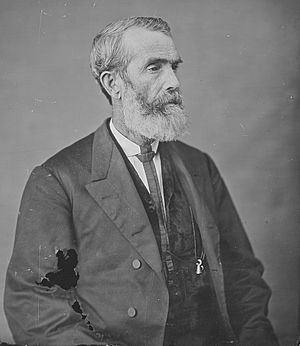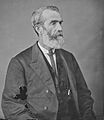James Mullins (American politician) facts for kids
Quick facts for kids
James Mullins
|
|
|---|---|
 |
|
| Member of the U.S. House of Representatives from Tennessee's 4th district |
|
| In office March 4, 1867 – March 3, 1869 |
|
| Preceded by | Edmund Cooper |
| Succeeded by | Lewis Tillman |
| Member of the Tennessee House of Representatives | |
| In office 1865-1867 |
|
| Personal details | |
| Born | September 15, 1807 Bedford County, Tennessee, United States |
| Died | June 26, 1873 (aged 65) Shelbyville, Tennessee |
| Resting place | Arnold Cemetery Shelbyville, Tennessee |
| Political party | Republican |
| Profession | millwright, politician |
James Mullins (born September 15, 1807 – died June 26, 1873) was an American politician. He represented Tennessee's 4th congressional district in the United States House of Representatives from 1867 to 1869. He also served one term in the Tennessee House of Representatives from 1865 to 1867.
Mullins was a strong supporter of the Republican Party. He worked closely with Governor William G. Brownlow in the state legislature. He played a key role in helping to pass the Fourteenth Amendment in Tennessee. During the Civil War, Mullins was against the Southern states leaving the Union. He served as an advisor to General William Rosecrans in the Union Army.
Contents
Early Life and Civil War Service
James Mullins was born in Bedford County, Tennessee, on September 15, 1807. He started his career as a farmer. Later, he became a successful millwright, which is someone who designs or builds mills. In 1831, he was made a colonel in the Tennessee state militia. He also served as the Sheriff of Bedford County from 1840 to 1846.
Mullins was first a member of the Whig Party. After this party ended, he joined the American Party, also known as the "Know Nothings." By the late 1850s, he supported the Opposition Party. This group was made up of different politicians who wanted to stop states from leaving the Union.
When the Civil War began, Mullins was against Southern states seceding. Because of his views, he had to leave Bedford County in 1862. From 1862 to 1864, he served in the Union Army. He was part of General Williams Rosecrans's team, who led the Army of the Cumberland. Mullins was with the army during important battles like Stones River and Hoover's Gap. He also participated in the Tullahoma Campaign.
After the war, Mullins continued to support the Union. He was a member of the Union League of America. He also spoke at the Loyal Southern Convention in Philadelphia in 1866.
Serving in the State Legislature
In January 1865, James Mullins was chosen to run for the Tennessee House of Representatives. He would represent Bedford and Rutherford counties. He won the election on March 4, 1865. The legislature met in April and quickly approved the Thirteenth Amendment. This important amendment made slavery illegal across the country.
During this time, the state legislature was made up of Southern Unionists. However, two main groups formed: "conservatives" and "radicals." Conservatives wanted things to go back to how they were before the war, except for slavery. Radicals, like Mullins, wanted to give voting rights to African Americans. They also wanted to make sure former Confederates faced consequences. Mullins strongly supported the radical group and Governor William G. Brownlow.
In February 1866, a new law was proposed. It would give Governor Brownlow the power to reject votes in elections if former Confederates were suspected of voting. Some conservative lawmakers left the capital to stop the vote from happening. Mullins accused the Speaker of the House, William Heiskell, of organizing this walkout. Heiskell became very angry and threw his gavel at Mullins. Mullins calmly put the gavel in his pocket. The new law passed a few weeks later.
In July 1866, Governor Brownlow called a special meeting to discuss the Fourteenth Amendment. This amendment aimed to give civil rights to African Americans. Conservatives again tried to stop the vote by leaving. However, two of them were arrested and brought back to the House. This allowed the radicals to have enough members to vote. They passed the amendment. Mullins sometimes served as the temporary Speaker of the House during this period.
Time in Congress
Mullins first ran for a congressional seat in 1865 but lost to Edmund Cooper. Cooper was a friend of President Andrew Johnson and did not support the radical ideas. With Governor Brownlow's help, Mullins ran against Cooper again in 1867. Brownlow sent state guards to the district and stopped many people from registering to vote. This helped Mullins easily win the election.
In Congress, Mullins worked on committees related to territories and pensions for Revolutionary War soldiers. He was known as a good speaker who used humor and common sense. In February 1868, he voted to impeach President Andrew Johnson. He also voted for the Fifteenth Amendment in February 1869. This amendment gave voting rights to minorities.
Mullins did not run for reelection in 1869. He ran again in 1870, but he lost. By this time, former Confederates had regained the right to vote, which changed the election results.
Later Years
In April 1869, President Ulysses S. Grant appointed Mullins as the internal revenue collector for his district. He held this job until he passed away.
Because Mullins supported voting rights for African Americans, he became a target of the Ku Klux Klan. In October 1870, while he was campaigning, Klansmen attacked his farm. They burned his barn, stables, and mills. In January 1871, a group of Klansmen tried to break into a home where Mullins was staying, but they could not get in.
James Mullins died from cholera in Shelbyville on June 26, 1873. He is buried in the Arnold Cemetery near Shelbyville.
Images for kids
 | Ernest Everett Just |
 | Mary Jackson |
 | Emmett Chappelle |
 | Marie Maynard Daly |


